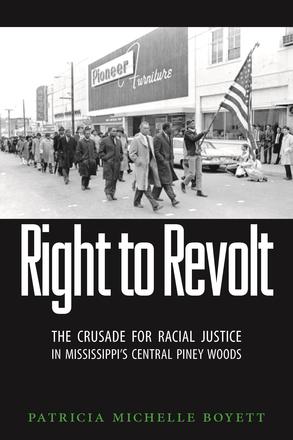
Right to Revolt
The Crusade for Racial Justice in Mississippi's Central Piney Woods
A revelation of the valorous nonviolent efforts wielded to motivate change in a “moderate” part of the segregated South
Description
On January 10, 1966, Klansmen murdered civil rights leader Vernon Dahmer in Forrest County, Mississippi. Despite the FBI's growing conflict against the Klan, recent civil rights legislation, and progressive court rulings, the Imperial Wizard promised his men: “no jury in Mississippi would convict a white man for killing a nigger. ” Yet this murder inspired change. Since the onset of the civil rights movement, local authorities had mitigated federal intervention by using subtle but insidious methods to suppress activism in public arenas. They perpetuated a myth of Forrest County as a bastion of moderation in a state notorious for extremism. To sustain that fiction, officials emphasized that Dahmer's killers hailed from neighboring Jones County and pursued convictions vigorously. Although the Dahmer case became a watershed in the long struggle for racial justice, it also obscured Forrest County's brutal racial history.
Patricia Michelle Boyett debunks the myth of moderation by exploring the mob lynchings, police brutality, malicious prosecutions, and Klan terrorism that linked Forrest and Jones Counties since their founding. She traces how racial atrocities during World War II and the Cold War inspired local blacks to transform their counties into revolutionary battlefields of the movement. Their electrifying campaigns captured global attention, forced federal intervention, produced landmark trials, and chartered a significant post-civil rights crusade. By examining the interactions of black and white locals, state and federal actors, and visiting activists from settlement to contemporary times, Boyett presents a comprehensive portrait of one of the South's most tortured and transformative landscapes.
Reviews
"This is a compelling story, with excellent historical documentation that will be of use to scholars for years to come."
- Minion K. C. Morrison, American Historical Review, June 2016
"Boyett's research is exhaustive. She mines over eighty archival collections, including the Mississippi State Sovereignty Commission files, FBI files, court records, and local and national newspapers. She has also conducted interviews with nearly fifty black and white residents of the Central Piney Woods, many of whom had never before been interviewed. . . . She also draws on forty-one other interviews, mostly housed at the Center for Oral History and Cultural Heritage (COHCH). This tremendous attention to the voices of the people on the ground is admirable and even more impressive considering that she has condensed this information into highly readable and engaging narrative."
- Rebecca Tuuri, The Journal of Southern History
"Boyett's evocative and richly detailed history of white supremacy and the struggle for black freedom in the Piney Woods region of Mississippi teaches us, as William Faulkner put it, 'The past is never dead. It's not even past.' From the first days of settlement to recent efforts to win convictions for civil rights era racial murders and wrongful convictions, Right to Revolt demonstrates both the deep roots and long reach of racism and inequality as well as the bold, consistent efforts by African Americans toward equal justice and human dignity. This is local history at its best—a deep plunge into a region that teaches us about the larger forces in America as a whole."
- Danielle L. McGuire, author of At the Dark End of the Street: Black Women, Rape, and Resistance—a New History of the Civil Rights Movement from Rosa Parks to the Rise of Black Power
"Right to Revolt is an important book for anyone interested in the civil rights movement, Mississippi history, or racial justice. Through her profile of the freedom struggle in Hattiesburg and Laurel, Boyett demonstrates the deep roots of the 1960s mass movement and just how much was at stake. Black activists demanded full citizenship, thrived in freedom schools, and refused to back down, even in the face of unrelenting white resistance that ranged from the misuse of the legal system to economic terrorism and murder. Boyett details the horrific violence perpetrated by the Sam Bowers-led Klan, the eventual response by the FBI, and the subsequent court battles that illustrated the movement's achievements and limitations. Perhaps most importantly, Right to Revolt carries the story into the new century, highlighting the persistence of both African American activism and the white supremacy that remains the backdrop for life in Mississippi's Piney Woods."
- Emilye Crosby, professor of history at the State University of New York at Geneseo and editor of Civil Rights History from the Ground Up: Local Struggles, a National Movement
"Patricia Boyett has distilled a staggering amount of research into a remarkable examination of one of the least studied regions of the most chronicled civil rights battlegrounds in America—Mississippi. This book is essential reading for anyone who wonders what is left to learn about the Magnolia State's unfinished freedom struggle."
- Jason Morgan Ward, associate professor of history at Mississippi State University